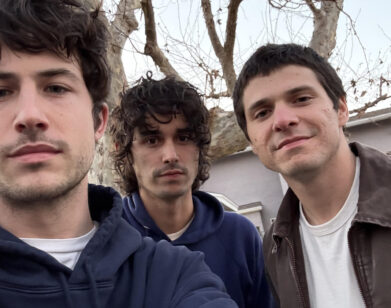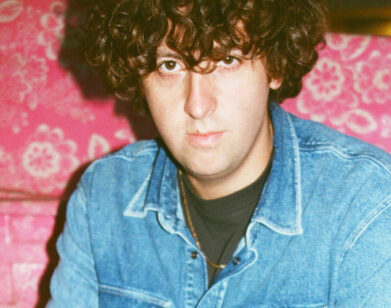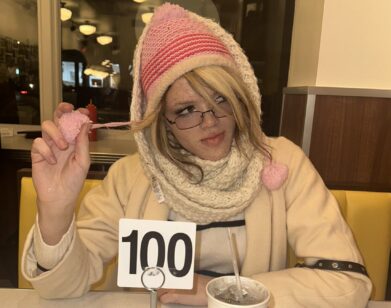Kevin Abstract
KEVIN ABSTRACT IN LOS ANGELES, OCTOBER 2016. PHOTOS: BRIAN HIGBEE/COPIOUS MANAGEMENT. STYLING: SUE CHOI. GROOMING: ANNA BERNABE/EXCLUSIVE ARTISTS MANAGEMENT USING COVERFX AND R+CO.
A product of the Texas suburbs, and born of the internet, Kevin Abstract sheds the tough, “cool” posturing of hip-hop in favor of frankness and sincerity. The refreshingly unironic 20-year-old, né Ian Simpson, started off posting tracks to MySpace in middle school, and chose his name for a simple reason. “I thought this kid was really cool when I was twelve, his name was Kevin,” he recalls. “Abstract—I wanted to describe my music based on the abstract. It’s such a 12-year-old name, but then it stuck … I think I’m just Kevin now, in a way.”
Earlier this year Kevin Abstract moved to Los Angeles, where he rooms with his bandmates; he’s a member of the boy band BROCKHAMPTON, which is also an artist collective and his record label. Today he releases American Boyfriend: A Suburban Love Story (Brockhampton), his debut solo album. Its writing is intimate: “A lot of stuff is so personal that I don’t really ask for opinions, because it might get in the way of how close to home it is,” he says. He entered the album with the surprising aim of sounding “more Vanessa Carlton-like” and embraces a shoegaze style. His distinctive vision extends beyond music; he’s designed apparel, directed the music video for his track “Empty,” and has been working on a screenplay for years that he’s now turning into a film. Of his broad interests and unanticipated influences, he merely says, “It’s all me.”
When Abstract recently visited New York, we met on a SoHo stoop and spoke about growing up, insecurities, and his favorite filmmakers.
KEVIN ABSTRACT: In the process of making the album, I’ve been really focused and listening to a lot of Vanessa Carlton, Sunny Day Real Estate… Weird ’90s stuff and early 2000’s pop music—the kind of stuff that people consider cheesy, I guess.
HALEY WEISS: What do you find interesting about music that people think is cheesy?
KEVIN ABSTRACT: Most of those songs are really big, you know? It doesn’t really matter if it’s cliché or not. I think cliché is a good thing sometimes.
WEISS: You’ve written a lot about growing up in the suburbs, so tell me a little about where you grew up and what your childhood was like.
KEVIN ABSTRACT: The suburb I’m normally talking about is The Woodlands, Texas; it’s north of Houston. It’s typical American suburbia. I draw a lot of inspiration from that. And I don’t know why I’m so intrigued by it yet—I don’t know what it is or what draws me back over and over. There’s something beautiful and mysterious about it and kind of haunting. I keep going back to it.
WEISS: When did you leave the suburbs?
KEVIN ABSTRACT: When I was 17. Then I was traveling around the U.S., and then I made my way to Texas again in a college town.
WEISS: Did you leave specifically to make music?
KEVIN ABSTRACT: Yeah, I left to actually go on a bit of a tour—a small, little tour. I wanted to get out and perform, and just feel free from school and everything that I felt was trapping me.
WEISS: When did music come into the picture for you in terms of writing?
KEVIN ABSTRACT: When I was in the fourth grade, because I wanted to be like Will Smith. So I just copied him.
WEISS: When did it become something that, instead of copying Will Smith, you thought, “I’m going to take this seriously. I’m going to get my music out there.”
KEVIN ABSTRACT: I would say sixth grade, when I discovered that I could put my own music on MySpace.
WEISS: What was the best response you got from someone online that you didn’t know?
KEVIN ABSTRACT: I used to post on forums all the time, and a lot of those kids hated me on those forums, but eventually they started to respect me. When those kids would respect me it made me feel really good about myself, even though they’re just other musicians on the forum. It felt good to have that validation.
WEISS: What do you think made them go from hating you to respecting you?
KEVIN ABSTRACT: Just growth.
WEISS: What has changed since your debut in terms of the way that you approach music?
KEVIN ABSTRACT: Supreme focus: that’s my thing now. I’m just extremely focused on whatever it is that I’m writing. It’s way more centered, I guess.
WEISS: When you started working on the new music for this record, who was the first person that you wanted to play it for to get their opinion?
KEVIN ABSTRACT: Oh wow, the first person… I’ve always wanted Tyler The Creator to hear it. [But] Michael Uzowuru, a guy who ended up being executive producer [was first]. I’m very glad he listened to it.
WEISS: What do you think has been the most difficult song for you to write?
KEVIN ABSTRACT: This song I have called “Papercut” [on the new album]. I was really scared to record it at first, especially because other people were in the room. It was a weird thing.
WEISS: How do you get past that feeling and make yourself do it, when you’re feeling nervous about a song that you’re working on?
KEVIN ABSTRACT: I think about what I’m writing about, and I ask myself if it’s bigger than me or not.
WEISS: That’s a good test. Would you describe music as something that you have to do, that you feel compelled to do?
KEVIN ABSTRACT: It’s the only thing I really want to do. It helps me… It’s almost like therapy. I feel like I have to do it.
WEISS: I read an interview where you said that the reason your music bends genres is because you don’t know who you are yet. Do you still feel that way?
KEVIN ABSTRACT: Yeah, 100 percent. And the album is about self-discovery. I believe that self-discovery is an ongoing thing. I might not ever fully know who I am, but I also believe that I could be whoever I want, whenever I want.
WEISS: In putting together the album, did you come up with the theme based on your song “American Boyfriend”?
KEVIN ABSTRACT: I just really wanted to write something about the suburbs that was conceptually as good as Arcade Fire’s The Suburbs.
WEISS: What’s the best part about growing up in the suburbs and what’s the worst part?
KEVIN ABSTRACT: The worst part was definitely being black. The best part was maybe also being black. Just having that perspective, being on the outside while also being on the inside. That’s kind of how I’ve felt my whole life.
WEISS: What kind of music did you listen to growing up? Do you remember the first time you heard an album or a song and thought, “This is what I like”?
KEVIN ABSTRACT: It was probably either “I’m Like A Bird” by Nelly Furtado or the song by Nelly, “Ride Wit Me.” It just felt really good. It made me feel good as a kid. I could put it on now and still go back to that feeling.
WEISS: The video you came out with recently for “Empty” is very cinematic. Did you come up with the concept for that?
KEVIN ABSTRACT: It was cool because I got to direct it. The person who came up with the concept was the guy that executive produced my album. We’ve got to keep everything in house because we see it all in our heads first, like, “Oh, we’re writing the songs, we might as well just do the visual stuff, too.”
WEISS: Are visuals important to you?
KEVIN ABSTRACT: Extremely. I take a lot of inspiration from directors.
WEISS: What directors are at the top of your list?
KEVIN ABSTRACT: Paul Thomas Anderson, David Fincher. I’m just now getting into Larry Clark—I know I’m late. I like Gia Coppola even though she only has like, one film.
WEISS: Are there soundtracks in movies that influence the way that you think about an album?
KEVIN ABSTRACT: I forgot to say Andrea Arnold. I saw American Honey three times in a row. Sorry, I cut you off—but soundtracks… I like soundtracks more than scores. Does that make sense? I like when select songs are in movies and it’s not just one thing. I like Tarantino too. He’s big on soundtracks.
WEISS: Music is so important to the way he writes, too; he writes to music. When you’re writing do you listen to anything?
KEVIN ABSTRACT: Yeah, I have music on when I’m writing music. Sometimes I can write with nothing, but it depends.
WEISS: Do you write anything other than music? Do you write stories or anything like that?
KEVIN ABSTRACT: I’ve been working on a screenplay since I was 17. I finally met somebody who was willing to turn it into something. … I’m excited. We’ll see what comes out of that.
WEISS: What’s the most difficult part of the writing process for you—beginning, middle, end?
KEVIN ABSTRACT: Sometimes ending it. The most difficult part for me is always releasing something. I’m extremely vulnerable in my music, but it’s hard to be this vulnerable face-to-face with a person. I’m just now getting a little more comfortable with interviews—like today.
WEISS: I’m sure it’s difficult when you’ve been working on something so intently, and putting all of yourself into it, to get it out there.
KEVIN ABSTRACT: Yeah. And someone told me yesterday, “You’re so open in your music. It’s interesting that you have this guard up when you’re talking to me, but you seem so, ‘This is me, this is me,’ in your music.” That’s because when I record it it’s not out. I can think about not releasing it. If I’m tweeting something I can be in control and just delete it. But if I’m talking to a journalist I’m not in control of that. … I might change my mind. I don’t know—that’s life I guess. I guess that’s what happens when you grow up on the internet and in control of how you look.
WEISS: I think everyone changes their mind. Maybe you can look at interviews from now as a record of the way that you thought about things then. I read that you’re working on some clothing too?
KEVIN ABSTRACT: Yeah, a little bit. Just stuff that I think I would wear and people like me would wear, so basically my fans.
WEISS: You have a broad practice then: music, screenwriting, designing. Do you consider yourself a musician first?
KEVIN ABSTRACT: I still don’t even consider myself a musician.
WEISS: Why not?
KEVIN ABSTRACT: I don’t think my skill level is up there as a musician. I think I’m best at writing in general. … The musicians that I know are really good, and I feel like I have a lot to do until I become a musician.
WEISS: Was anyone in your family involved in music growing up?
KEVIN ABSTRACT: No, not at all.
WEISS: So what was the reaction when you said, “Hey, I’m making music and I’m touring.”
KEVIN ABSTRACT: I think that everyone thought it was a hobby at first, so to see me turn it into something and leave home and not go to college was surprising.
WEISS: Once they realized how seriously you were taking it, did they say anything insightful about your music?
KEVIN ABSTRACT: My mom told me that she didn’t know I could sing. That was cool. I never sang growing up.
WEISS: How did you know you were good if it wasn’t something you did publicly?
KEVIN ABSTRACT: I never thought I could sing. I still don’t. Someone came up to me who was extremely talented and told me that I had a good voice, and I was like, “I can’t sing.” I felt so bad after saying that—he just gave me a compliment.
WEISS: I guess if writing is what you see yourself as the strongest in, then singing is just a way to get it out?
KEVIN ABSTRACT: Exactly. If the words make sense on paper, and make me feel good, and I feel like it will connect, that’s all I’m worried about it.
AMERICAN BOYFRIEND: A SUBURBAN LOVE STORY (BROCKHAMPTON) IS OUT TODAY, NOVEMBER 18, 2016. FOR MORE ON KEVIN ABSTRACT, VISIT HIS WEBSITE.







